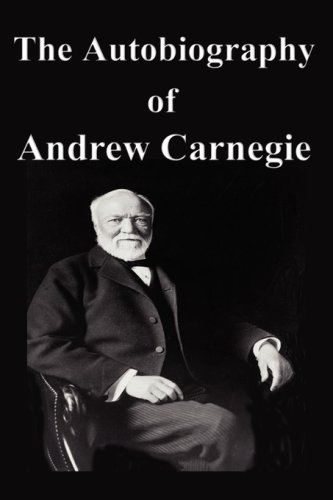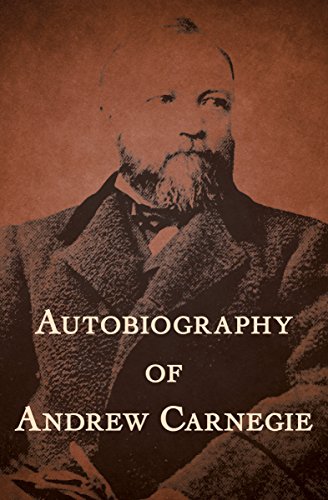-
Autobiography of Andrew Carnegie
Andrew Carnegie, John Charles Van Dyke
eBookThis book was converted from its physical edition to the digital format by a community of volunteers. You may find it for free on the web. Purchase of the Kindle edition includes wireless delivery.
-
The Autobiography of Andrew Carnegie and the Gospel of Wealth
Andrew Carnegie, Gordon Hutner
Mass Market Paperback (Signet, Nov. 7, 2006)The enlightening memoir of the industrialist as famous for his philanthropy as for his fortune. His good friend Mark Twain dubbed him “St. Andrew.” British Prime Minister William Gladstone called him an “example” for the wealthy. Such terms seldom apply to multimillionaires. But Andrew Carnegie was no run-of-the-mill steel magnate. At age 13 and full of dreams, he sailed from his native Dunfermline, Scotland, to America. The story of his success begins with a $1.20-a-week job at a bobbin factory. By the end of his life, he had amassed an unprecedented fortune—and given away more than 90 percent of it for the good of mankind. Here, for the first time in one volume, are two impressive works by Andrew Carnegie himself: his autobiography and “The Gospel of Wealth,” a groundbreaking manifesto on the duty of the wealthy to give back to society all of their fortunes. And he practiced what he preached, erecting 1,600 libraries across the country, founding Carnegie Mellon University, building Carnegie Hall, and performing countless other acts of philanthropy because, as Carnegie wrote, “The man who dies thus rich dies disgraced.” With an Introduction by Gordon Hutner
-
Autobiography of Andrew Carnegie
Andrew Carnegie, John Charles Van Dyke
language (, March 30, 2011)This book was converted from its physical edition to the digital format by a community of volunteers. You may find it for free on the web. Purchase of the Kindle edition includes wireless delivery.
-
The Autobiography of Andrew Carnegie & The Gospel of Wealth
Andrew Carnegie, David McCallion, A.R.N. Publications
Audible Audiobook (A.R.N. Publications, Oct. 24, 2017)During the great industrial age, Andrew Carnegie was in a class of his own. Also known as a great steel baron, Carnegie believed in investing in philanthropic causes and the future of mankind. One of Carnegie's most notorious sayings was that any man that dies rich - dies disgraced. Although born in Scotland, Andrew Carnegie immigrated to the United States with his parents as a young child. He began his climb to the top as a modest errand boy and eventually moved into the steel industry. By the time he was an adult, Carnegie was one of the richest men in the country. Known as a generous man, he spent a great deal of his fortune investing in organizations that aimed to advance social progress and improve conditions for people of all classes. Andrew Carnegie was also intensely interested in world peace and the security of democracy.
-
The Autobiography of Andrew Carnegie
Andrew Carnegie, Antony Ferguson, Tantor Audio
Audiobook (Tantor Audio, May 10, 2012)Andrew Carnegie was an immigrant, a poor boy who worked in a cotton mill, a man who amassed a great fortune as a steel baron and then became one of the most generous and influential philanthropists the world has ever known. His famous dictum, that he who dies rich dies disgraced, has inspired philanthropists and philanthropic enterprises for generations. During his own lifetime, he put his ideas into action by creating a family of organizations that continue to work toward improving the human condition, advancing international peace, strengthening democracy, and creating societal progress that benefits men, women, and children in the United States and around the globe.Here, in his own words, Mr. Carnegie tells the dramatic story of his life and career, outlining the principles that he lived by and that today serve as the pillars of modern philanthropy.
-
The Autobiography of Andrew Carnegie and The Gospel of Wealth
Andrew Carnegie, Gordon Hutner
eBook (Signet, Nov. 7, 2006)The enlightening memoir of the industrialist as famous for his philanthropy as for his fortune. His good friend Mark Twain dubbed him “St. Andrew.” British Prime Minister William Gladstone called him an “example” for the wealthy. Such terms seldom apply to multimillionaires. But Andrew Carnegie was no run-of-the-mill steel magnate. At age 13 and full of dreams, he sailed from his native Dunfermline, Scotland, to America. The story of his success begins with a $1.20-a-week job at a bobbin factory. By the end of his life, he had amassed an unprecedented fortune—and given away more than 90 percent of it for the good of mankind. Here, for the first time in one volume, are two impressive works by Andrew Carnegie himself: his autobiography and “The Gospel of Wealth,” a groundbreaking manifesto on the duty of the wealthy to give back to society all of their fortunes. And he practiced what he preached, erecting 1,600 libraries across the country, founding Carnegie Mellon University, building Carnegie Hall, and performing countless other acts of philanthropy because, as Carnegie wrote, “The man who dies thus rich dies disgraced.” With an Introduction by Gordon Hutner
-
The Autobiography of Andrew Carnegie and The Gospel of Wealth
Andrew Carnegie
Paperback (Digireads.com, Jan. 1, 2009)From his humble beginnings as a Scottish immigrant to his ascension to wealth and power as a 'captain of industry,' Andrew Carnegie embodied the American 'rags to riches' dream. Alive in the time of the Civil War, Carnegie was the epitome of a self-made man, first working his way up in a telegraph company and then making astute investments in the railroad industry. Through hard work, perseverance, and an earnest desire to develop himself in his education, culture, and personal economy, Carnegie finally made his considerable fortune in steel. What is perhaps most remarkable about this historical figure, however, was his overwhelmingly generous practice of philanthropy in his later life. In his essay "The Gospel of Wealth," Carnegie relates his ideas on the distribution of the rich's wealth to the poor in a responsible capitalistic society. In setting an example of his own beliefs, Carnegie gave away millions of dollars for the public good, demonstrating his own willingness to promote human welfare and the betterment of man.
-
The Autobiography of Andrew Carnegie and The Gospel of Wealth
Andrew Carnegie
Paperback (CreateSpace Independent Publishing Platform, July 5, 2010)Carnegie was one of the most famous leaders of industry of the late 19th and early 20th centuries . His net worth in 2007 dollars would have been $298.3 billion according to Forbes magazine. The Autobiography of Andrew Carnegie , was published posthumously in 1920. The Gospel of Wealth, is an essay written by Andrew Carnegie in 1901 that described the responsibility of philanthropy by the new upper class of self-made rich. The central thesis of Carnegie's essay was the peril of allowing large sums of money to be passed into the hands of persons or organizations ill-equipped mentally or emotionally to cope with them. As a result, the wealthy entrepreneur must assume the responsibility of distributing his fortune in a way that it will be put to good use, and not wasted on frivolous expenditure.
-
"The Autobiography of Andrew Carnegie" -and- "The Gospel of Wealth"
Andrew Carnegie
Audio CD (Blackstone Audio, Inc., Jan. 16, 2018)[Read by John Lescault]His good friend Mark Twain dubbed him ''St. Andrew.'' British Prime Minister William Gladstone called him an ''example'' for the wealthy. Such terms seldom apply to multimillionaires. But Andrew Carnegie was no run-of-the-mill steel magnate. At age thirteen and full of dreams, he sailed from his native Dunfermline, Scotland, to America. The story of his success begins with a $1.20-a-week job at a bobbin factory. By the end of his life, he had amassed an unprecedented fortune -- and given away more than ninety percent of it for the good of mankind.Here, for the first time in one volume, are two impressive works by Andrew Carnegie himself: his autobiography and ''The Gospel of Wealth,'' a groundbreaking manifesto on the duty of the wealthy to give back to society all of their fortunes. And he practiced what he preached, erecting 1,600 libraries across the country, founding Carnegie Mellon University, building Carnegie Hall, and performing countless other acts of philanthropy because, as Carnegie wrote, ''The man who dies thus rich dies disgraced.''
-
The Autobiography of Andrew Carnegie
Andrew Carnegie
Hardcover (FQ Classics, Sept. 17, 2007)After retiring from active business, Andrew Carnegie yielded to the earnest solicitations of friends, both in the United States and in Great Britain, and began to jot down from time to time recollections of his early days. He soon found, however, that instead of the leisure he expected, his life was more occupied with affairs than ever before, and the writing of these memoirs was reserved for his play-time in Scotland. For a few weeks each summer we retired to his little bungalow on the moors at Aultnagar to enjoy the simple life, and it was there that Mr. Carnegie did most of his writing. He delighted in going back to those early times, and as he wrote he lived them all over again. This book is a must read for those interested in the life of this important business leader, and this is a book which contains many great stories and lessons from the life of Andrew Carnegie in his own words and in his own buoyant style.
-
Autobiography of Andrew Carnegie
Andrew Carnegie
language (Open Road Media, Sept. 22, 2015)A critically acclaimed autobiography that exemplifies the American Dream by one of nineteenth-century America’s most philanthropic businessmen. Scottish immigrant Andrew Carnegie worked his way up from bobbin boy to telegraph operator to railroad man, learning key lessons along the way that would eventually lead to his unparalleled success in the steel business. Documenting a world of tariffs, insider deals, and Wall Street sharks, The Autobiography of Andrew Carnegie opens a window into the great industrialist’s decision-making process. His insights on education, business, and the necessity of giving back for the common good set an inspirational example for aspiring executives and provide a fitting testament to the power of the American dream. This ebook has been professionally proofread to ensure accuracy and readability on all devices.
-
The Autobiography of Andrew Carnegie: with The Gospel of Wealth
Andrew Carnegie, John Charles Van Dyke
Paperback (CreateSpace Independent Publishing Platform, March 16, 2017)Andrew Carnegie ( November 25, 1835 – August 11, 1919) was a Scottish American industrialist who led the expansion of the American steel industry in the late 19th century, and is often identified as one of the richest people and Americans ever. He built a leadership role as a philanthropist for the United States and the British Empire. During the last 18 years of his life, he gave away to charities, foundations, and universities about $350 million (in 2015 share of GDP, $78.6 billion) – almost 90 percent of his fortune. His 1889 article proclaiming "The Gospel of Wealth" called on the rich to use their wealth to improve society, and it stimulated a wave of philanthropy.